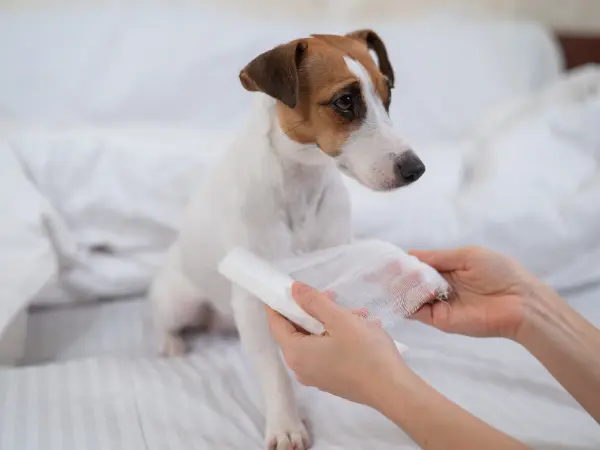Pomeranians are renowned for their endearing faces, luxurious double coats, alert personalities, and lively charm. This is why they are often preferred by pet parents who enjoy small but spirited companions. In addition, as a small dog breed, Pomeranians tend to age slowly, reaching their senior years around 8–11 years old, meaning they often stay playful and puppy-like for longer.
If you’d like to learn all about Pomeranian health issues and care tips, read on! In this Sploot Vets guide, we discuss their overall care and how to prevent common Pomeranian dog health problems.

Are Pomeranians High-Maintenance Dogs?
Yes, Pomeranians are considered high-maintenance dogs. This is because of the following:
- Grooming needs – Their thick double coat requires frequent brushing and regular trims to prevent matting. Pomeranians are also year-round shedders with increased shedding during certain seasons, requiring frequent brushing to keep their coat healthy.
- Need for affection and attention – Pomeranians thrive on human interaction and can develop separation anxiety if left alone too often. Poms can, however, be gradually trained to handle time on their own.
In addition to the above, Pomeranians, like other dog breeds, benefit from general care. This includes appropriate exercise, a nutritious diet formulated for small dogs, and regular pet wellness exams to keep them in their best shape.
Common Pomeranian Health Issues & Problems
All dog breeds are susceptible to certain health issues; Pomeranians are no different. By being aware of the following Pomeranian health issues, pet parents can take proactive steps to help prevent the following:
- Dental Disease – Small dog breeds like Pomeranians are especially prone to dental problems, including tartar buildup, gum disease, and tooth loss. This is because their smaller jaws and crowded teeth make it easier for bacteria to thrive. Regular dental cleanings and at-home brushing help prevent these issues.
- Tracheal Collapse –This condition occurs when the tracheal rings weaken, leading to a chronic cough or difficulty breathing. Pomeranians are genetically predisposed to tracheal collapse because of their small airway structures. Using a harness instead of a collar can reduce pressure on the neck and help prevent worsening symptoms.
- Luxating Patella, Trick Knees, or Slipping Kneecaps – This condition is common in Pomeranians due to hereditary factors. It causes the kneecap to shift out of place, leading to limping or skipping gaits. Severe cases may require surgical correction.
- Hypothyroidism - Pomeranians have a genetic predisposition to hypothyroidism, an endocrine disorder wherein the thyroid gland doesn’t produce enough hormones, leading to weight gain, lethargy, and skin or coat problems. Routine bloodwork during vet visits can help catch this condition early and prevent complications.
- Heart disease – Pomeranians are at risk for several heart conditions, including mitral valve disease. Over time, this can lead to coughing, exercise intolerance, or difficulty breathing. Regular veterinary exams and early intervention are key to managing heart health.
Pomeranian Care 101: How Do I Keep My Pom Healthy & Happy?
1. Health & Veterinary Care for Pomeranians
To keep your Pomeranian in their best health, we recommend staying on top of yearly or bi-yearly pet wellness exams—along with canine vaccinations and heartworm preventives.
Note: Regular pet wellness exams for Pomeranians are essential for catching health issues early, especially since Pomeranians are prone to conditions like tracheal collapse and heart problems. In addition, heartworm preventives and screening are important, as these small dogs are especially vulnerable to complications from heartworm disease.
2. Dental Care for Pomeranians
Regular dental care is recommended for all breeds. For Pomeranians, they are vital because Pomeranian teeth are prone to overcrowding and tartar buildup, which can quickly lead to gum disease and tooth loss.
Here are a few tips to maintain oral health and prevent dental issues in dogs:
- Book yearly dental checkups and professional dog teeth cleanings with your vet
- Brush your Pomeranian’s teeth on a regular basis (at least several times a week)
- Offer dental chews for dogs for added at-home cleaning
3. Pomeranian Nutrition & Diet
A balanced diet for Pomeranians includes all their daily required nutrients, meeting AAFCO’s standards for complete nutrition. A few additional features to look for include:
- Lean animal protein for muscle maintenance
- Omega-3s for overall health and keeping their double coat shiny
- Complex carbs in small portions provide energy without overloading their digestive system
- Calcium for stronger teeth and bones
- Lycopene for supporting heart health
Note: In addition, portion control is crucial for Pomeranians because their small size makes them prone to obesity, which can strain their heart, joints, and overall health.
4. Pomeranian Exercise & Mental Stimulation
Pomeranians may be tiny, but they have the spirited energy of their larger Spitz and working-dog ancestors. It is recommended to give them about 30 minutes of exercise every day. The best and safest forms of exercise for this dog breed include short-distance fetch, short brisk walks, and interactive play.
Note: To reduce the risk of triggering or aggravating tracheal collapse, use a size-appropriate harness for your Pomeranian, instead of a collar.
5. Pomeranian Grooming Tips
Regular grooming is a vital part of proper Pomeranian care. Pomeranians have a thick double coat that requires regular upkeep to stay healthy and mat-free. Ideally, they should be brushed daily with a slicker brush and/or metal comb, especially during shedding season for dogs. Like other dog breeds, they can also benefit from monthly baths.
Pomeranians also need regular dog ear cleaning, at least once a month; it’s best done after a bath. We recommend using a mild vet-approved dog ear cleaner.
→ Learn more - Routine Dog Care for Health & Well-Being [Vet-Approved Checklist]

How To Take Care Of A Pomeranian Puppy
Caring for a Pomeranian puppy involves choosing age- and size-appropriate puppy food, early training (e.g., potty training, puppy socialization), and a comprehensive puppy exam shortly after bringing them home.
→ Learn More - How to Take Care of a New Puppy 101: The 1st Year [Vet-Approved]
Note: Because Pomeranians are a toy breed, they are more prone to low blood sugar or hypoglycemia, especially while they are still puppies. Therefore, it is best to feed Pomeranian puppies frequently, in small amounts. Adhere to the frequency and quantity recommended by your veterinarian.
Personalized Pomeranian Care at Sploot Vets
At Sploot Vets, we know Pomeranians have unique health needs—from dental care to heart health and preventive wellness. Our all-in-one veterinary clinics offer primary care, urgent care, and emergency services, along with breed-specific, personalized care for Pomeranians.
With our Fear Free approach, we ensure that puppies, seniors, and anxious pets feel comfortable at every visit.
Visit one of our convenient locations in Denver, Chicago, and Colorado Springs! We’re open 365 days a year with extended hours, making it easy to get the right care when you need it most.
Book an appointment here or through the Sploot Vets app!






